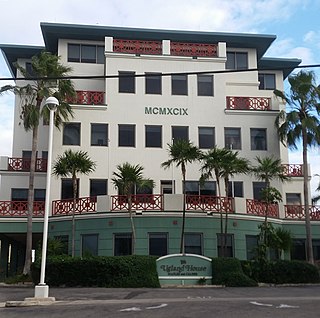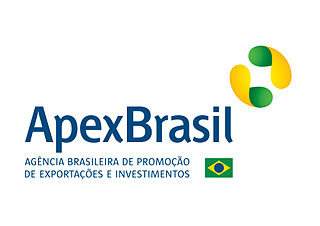
The economy of Indonesia is a mixed economy with dirigiste characteristics, and it is one of the emerging market economies in the world and the largest in Southeast Asia. As an upper-middle income country and member of the G20, Indonesia is classified as a newly industrialized country. Indonesia nominal GDP reached 20.892 quadrillion rupiah in 2023, it is the 16th largest economy in the world by nominal GDP and the 8th largest in terms of GDP (PPP). Indonesia's internet economy reached US$77 billion in 2022, and is expected to cross the US$130 billion mark by 2025. Indonesia depends on the domestic market and government budget spending and its ownership of state-owned enterprises. The administration of prices of a range of basic goods also plays a significant role in Indonesia's market economy. However, micro, medium and small companies contribute around 61.7% of the economy and significant major private owned companies and foreign companies are also present.
Japan External Trade Organization is an Independent Administrative Institution established by Japan Export Trade Research Organization as a nonprofit corporation in Osaka in February 1952, reorganized under the Ministry of International Trade and Industry (MITI) in 1958, and became an Independent Administrative Institution in 2003 to consolidate Japan's efforts in export promotion. The government has provided more than half of JETRO's annual operating budget. As of January 2020, JETRO maintained seventy-four offices in fifty-four countries, as well as forty-eight regional offices in Japan, with a total staff of 1,730. Its main office is located in the Ark Mori Building in Akasaka, Tokyo. Initially, JETRO's activities focused mainly on promoting exports to other countries. As exporters established themselves in world markets and the balance of trade turned from deficit to surplus, however, JETRO's role shifted to encompass more varied activities. These have included the furtherance of mutual understanding with trading partners, strategic investment attraction, import promotion, liaison between small businesses in Japan and their overseas counterparts, and data dissemination. Import promotion services have included publications, promotion of trade fairs, seminars, and trade missions.
The Australian Trade and Investment Commission, or Austrade, is the Australian Government's trade, investment and education promotion agency which was also given responsibility for tourism policy, programs and research from 2013. Austrade was established under the Australian Trade Commission Act 1985. It is a non-corporate Commonwealth entity under the Public Governance, Performance and Accountability Act 2013, and a statutory agency under the Public Service Act 1999. Austrade is part of the Foreign Affairs and Trade portfolio.
The Taiwan Miracle or Taiwan Economic Miracle refers to Taiwan's rapid economic development to a developed, high-income country during the latter half of the twentieth century.
The Industrial Development & Renovation Organization of Iran (IDRO) known as IDRO Group was established in 1967 in Iran. IDRO Group is one of the largest companies in Iran. It is also one of the largest conglomerates in Asia. IDRO's objective is to develop Iran's industry sector and to accelerate the industrialization process of the country and to export Iranian products worldwide. Today, IDRO owns 117 subsidiaries and affiliated companies both domestically as well as internationally.

India Brand Equity Foundation (IBEF) is a Trust established by the Department of Commerce, Ministry of Commerce and Industry, Government of India. IBEF's primary objective is to promote and create international awareness of the Made in India label in markets overseas and to facilitate the dissemination of knowledge of Indian products and services. Towards this objective, IBEF works closely with stakeholders across government and industry.

The U.S. Trade and Development Agency (USTDA) is an independent agency of the United States government, formed in 1992 to advance economic development and U.S. commercial interests in developing and middle income countries.

Foreign direct investment in Iran (FDI) has been hindered by unfavorable or complex operating requirements and by international sanctions, although in the early 2000s the Iranian government liberalized investment regulations. Iran ranks 62nd in the World Economic Forum's 2011 analysis of the global competitiveness of 142 countries. In 2010, Iran ranked sixth globally in attracting foreign investments.

UK Trade & Investment (UKTI) was a UK Government department working with businesses based in the United Kingdom to assist their success in international markets, and with overseas investors looking to the UK as an investment destination. It was replaced in July 2016 by the Department for International Trade.

SARIO, Slovak Investment and Trade Development Agency is a government agency established in the Slovak Republic in 2001, which works under the direction of the Ministry of Economy of the Slovak Republic.
The Incheon Free Economic Zone (IFEZ), located in Incheon, South Korea is a Korean Free Economic Zone that consists of the three regions of Songdo, Cheongna, and the island of Yeongjong and has a total area of 51,739 acres (209.38 km2). The goal of the IFEZ is to transform these three areas into hubs for logistics, international business, leisure, and tourism for the Northeast Asian region. Incheon's Free Economic Zone was officially designated by the Korean government in August 2003. IFEZ is planned to be a self-contained living and business district featuring air and sea transportation, a logistics complex, an international business center, financial services, residences, schools and hospitals, and shopping and entertainment centers.
Lingo24 is a UK-registered translation company that was formed in 2001.

Ugland House is a building located in George Town, Cayman Islands. Located at 121 South Church Street, the building is occupied by the law firm Maples and Calder and is the registered office address for 40,000 entities, including many major investment funds, international joint ventures and capital market issuers.

Invest KOREA (IK), Korea's national investment promotion agency, was established as part of the Korea Trade-Investment Promotion Agency (KOTRA) to promote foreign direct investment (FDI) to Korea. It provides comprehensive services for all investment stages of Korea, including investment feasibility study, investment execution, and grievance resolution.

The Literature Translation Institute of Korea was founded in 1996 by the Government of South Korea with the aim of promoting Korean literature and culture overseas.

Culinary diplomacy, gastrodiplomacy or food diplomacy is a type of cultural diplomacy, which itself is a subset of public diplomacy. Its basic premise is that "the easiest way to win hearts and minds is through the stomach". Official government-sponsored culinary diplomacy programs have been established in Taiwan, South Korea, Singapore, Thailand, Malaysia, Indonesia, Lebanon, Peru, Israel, the United States, Cambodia, Japan, and Nordic countries.

Aban Pestonjee is the chairperson and founder of the Abans group of companies. She is known as one of the first entrepreneurs who initiated in first bringing Korean technology to Sri Lankan consumers.

South Korean–Turkish relations are the foreign relations between South Korea and Turkey. The Turkish embassy is in Seoul, while the South Korean embassy in Ankara and a consulate-general in Istanbul. Both countries are members of the G20.

The Brazilian Trade and Investment Promotion Agency, or ApexBrasil is both the trade promotion organisation (TPO) and the investment promotion agency (IPA) of Brazil. Founded in 1997 as a subsidiary of the micro and small business support organisation SEBRAE, ApexBrasil became in 2003 an autonomous non-profit entity funded by the private sector and supervised by the Federal Government of Brazil. Formally linked to the Foreign Ministry since 2016, it promotes Brazilian products and services abroad, attracts foreign direct investment and supports national companies, especially small and medium-sized, on their international journey. Through its programmes and services, ApexBrasil supports approximately one third of Brazil's annual exports and contributes to facilitate at least one fourth of its foreign direct investment (FDI) inward flows each year. More than 15 thousand Brazilian companies are directly supported by the agency, virtually all of them micro, small or medium-sized.

The Costa Rican Foreign Trade Promoter (PROCOMER) is a Costa Rican governmental agency for investment and export promotion responsible for export promotion programs, attracting foreign direct investment, creating human talent development programs, and providing technical and financial support for the administration of Costa Rica's special export regimes.















